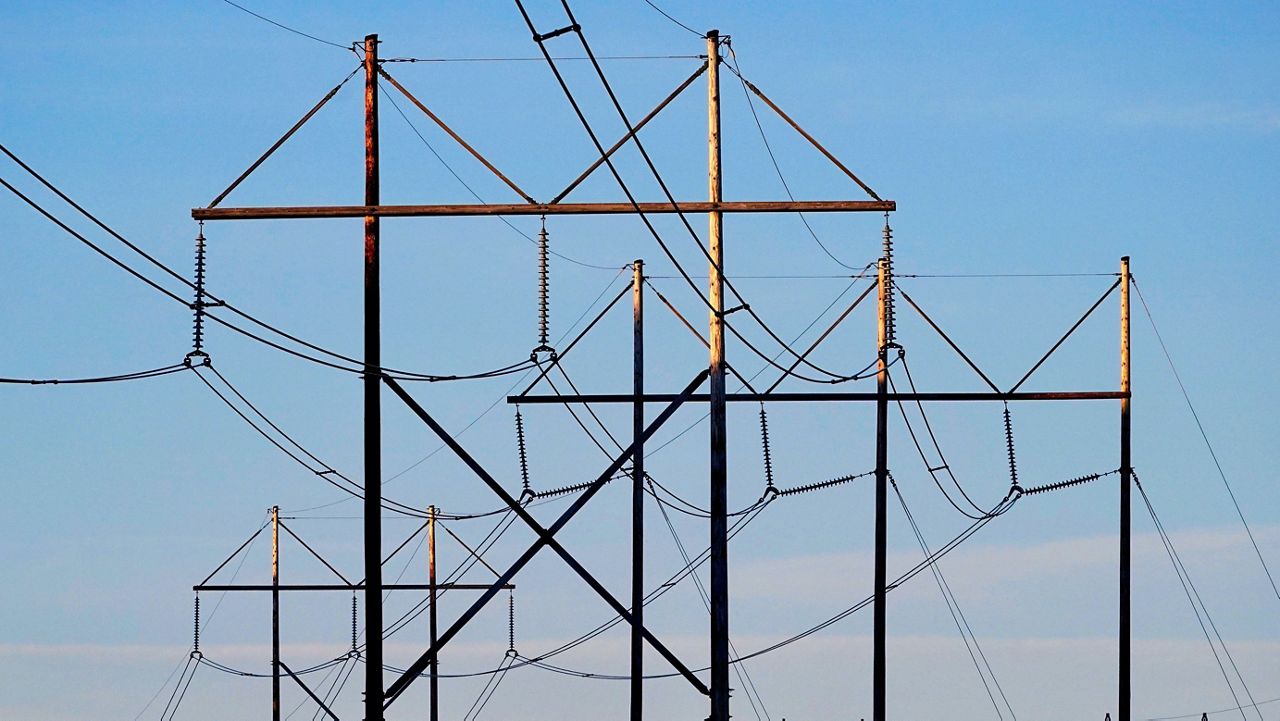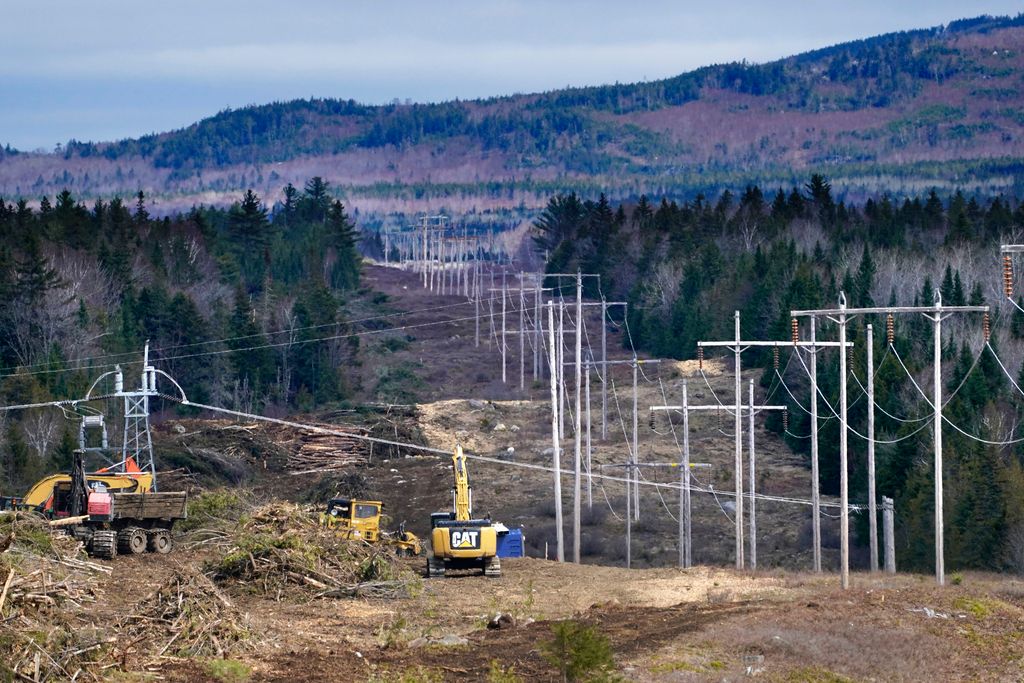A strange phenomenon can be seen in the replies to almost any social media post about the campaign to replace Maine’s investor-owned electric utilities with a consumer-owned nonprofit.
In Twitter threads, Facebook pages and comments on local news articles, a group of at least six self-styled “real Mainers” — their profile pictures showing dogs or lighthouses, with bios such as, “Just a girl from Maine!” or “Not from away” — first appeared online in January and have posted almost exclusively about an early-stage energy policy debate that many might find obscure.
“'Consumer Owned' actually means government controlled. 'More reliable' actually means taxpayers assuming the $13.5 billion in debt,” Twitter user @izzygreene207 replied to a related Portland Press Herald article on Jan. 20. “Our Power is bad for Maine!”
These talking points echo those of the utilities — Central Maine Power and Versant Power, who oppose the consumer-owned buy-out that the “Our Power” campaign hopes to put on the ballot in 2023 — and of Maine Affordable Energy, a political group organizing against that effort created and funded with nearly $3 million so far solely by CMP owner Avangrid, according to state campaign finance records.
None of the owners of these six social media accounts, created in January, responded to interview requests, and spokespeople for CMP, Versant and both of their related political groups denied involvement with these profiles, saying they didn’t create them and aren’t writing or paying for the posts.
But researchers who study online disinformation and political social media use say these accounts raise red flags, while shedding light on a complicated side of online politics in Maine.
Digital data analyzers such as Bot Sentinel and Botomoter, run by Indiana University’s Observatory on Social Media, can scout out fake or automated Twitter accounts that are common sources of scams or disinformation. These analyzers show mixed results for the nature of the six Maine utility-focused profiles created in January. A few score high for acting automated.
IU researcher Kevin Yang looked at the accounts in question and at their Botometer scores. He said despite their similarities to bots, he thinks a real person or people are behind these profiles.
“I wouldn’t be 100% sure that they are bots per se, although they are suspicious,” he said. “In this case, I think they are probably humans behind (them). I’m not sure how many humans.”
In addition to interview requests that were not returned, Spectrum News Maine attempted to verify the identities of these six accounts by searching for them in Maine on LinkedIn and public background check websites. Their names either did not appear, or were very common.
Another problem is that not all of the accounts have said where in Maine they live. One user by the name Mike Webber claims to be from Waterville. In addition to utility-related replies, he has tweeted only a handful of times about local events, getting lunch in the area or Boston sports.
Several people named Mike or Michael Webber with connections to Waterville came up in searches on other websites, but associated phone numbers were found to be disconnected when called. One number was answered by someone who said he was not Mike Webber.
Isabella Greene, another example, claims to be from Freeport on her Twitter page and from Brunswick on her Facebook. Her name did not come up at all in searches for Maine people on other sites. She has only ever posted about utility issues and, like the rest of the accounts made in January, did not respond to interview requests.
Two other accounts that often Tweet alongside people like Greene and Webber are more easily verifiable. One is Matthew Fishbein, a former chess champion and Maine Republican organizer who has focused heavily on the consumer-owned utility issue in recent months but did not respond to an interview request. The other is Scott Strom, a former state legislator in Pittsfield.
Strom said in an interview last week that Fishbein is the only one of these utility-focused Twitter users he knows. He said he’s chosen to Tweet frequently about this topic simply because he cares about it and takes issue with the Our Power proposal. He raised concerns about the costs and legality of the plan and said he personally hasn’t noticed major issues as a CMP customer.
“I don’t know what Pine Tree Power — that’s what they’re calling it — what are they going to do differently that’s going to provide better service?” Strom said.
Our Power and its online opponents differ on many complicated points about the details of the consumer-owned utility takeover, and the nature of the government’s role in it. With at least six months left for the campaign and its opponents to gather petition signatures for competing ballot initiatives and more than a year and a half until Election Day in 2023, there are a great deal of cost and policy questions still to answer.
But the politics of the issue are heating up now. Lately, the Our Power discourse has collided with a related debate about Gov. Janet Mills’ proposal for new accountability measures on CMP and Versant, which is still pending in the state legislature.
The utilities oppose the bill, but Our Power’s online opponents have begun posting in support of one potential version of it – a different version than Our Power is backing.
It adds up to a means of shaping and spreading a narrative, said University of Maine-Augusta sociologist James Cook. He said the similarities among the accounts created in January “strain credulity,” but it may not matter in the end whether they’re “real” themselves – their ubiquitous and consistent posts speak as one voice and can have a real impact.
“It creates an opening of acceptability for other people who might be seeing this to say, ‘Oh, it's OK to question Our Power Maine,’ or, ‘Oh, it appears Our Power Maine is not unopposed. Maybe I should look into that a little bit more.’ And that could affect how real people interface with this idea,” Cook said. “It gives people permission to consider that possibility.”
The “real Mainer” styling of these accounts is important too, he said. In northern New England, where constituencies are small and direct democracy is cherished, huge organizations that spend millions on political campaigns benefit from creating or imitating grassroots support.
“What happens at a town meeting is people stand up, and they say their name, and then if they can manage it, they can say, ‘And I've had family going back to 1692,’ or ‘My family's lived on the same road for five generations,’” Cook said. “And if you can say that, that gives your voice a little more heft, because the implied contrast is, ‘Not like one of these newcomers from away.’”
This is why Cook sees shades of a practice called astroturfing in Maine’s utility discourse. Named for the idea of “fake grassroots,” this is where interest groups drum up an apparent local groundswell of support or opposition on their issue of choice.
It can range from paid actors, as the energy company Entergy was found to be using at city council meetings in New Orleans, to slogans, campaign shirts and talking points that spread more organically, as in the case of CMP’s Western Maine transmission line proposal, where local political debate last year was heavily funded on both sides by out-of-state interest groups.
In the current Our Power discourse, UMaine political scientist Amy Fried sees reminders of both that campaign and the longer-running national feud over a different issue: universal health care. She pointed to an opposition strategy memo from the Clinton era of that issue that popularized the idea of a “government takeover” as a bogeyman.
“People have very negative views of the power companies,” she said. “I think what the anti-public power side is trying to do is to counter it by introducing something else that a lot of times people don't feel that good about, which is big government.”
The Our Power plan proposes a government-mandated buy-out of CMP and Versant by a new private nonprofit with a publicly elected board. But Fried said opponents’ insistence that the plan is a “government takeover” may be more about politics than policy.
Analysis from Bot Sentinel shows “government-run” and similar phrases as some of the top keywords used across all of the Twitter accounts in question. Another motif: that claim of a $13.5 billion-dollar price tag.
“It’s something I’ve seen a lot online,” Strom said when asked where he learned about this figure, which he has repeated in his posts. “When I’ve commented on it, there’s never been anybody – no one has ever come back … and said that’s not correct.”
It’s not clear where this figure comes from, but Our Power lists many lower figures on its own website. And like anything in the utility realm, the real answer to the cost of the proposal is much more complicated than a single dollar amount. Fried said this may be another goal of repetitive social media posts on an issue like this: sow confusion so voters err against change.
“There's a certain amount of bias towards just stability, and that's one reason why incumbents do well,” she said. “I know there are a lot of races where I'll hear people say, ‘I'm really having trouble understanding this.’ And when you don't understand it, it's always easier to vote no.”
Fried herself was still fuzzy on the details of the consumer-owned utility debate, though she said a campaigner for Maine Affordable Energy knocked on her door just the other week. She wasn’t aware at the time that the opposition group is backing a competing referendum of its own.
Willy Ritch, the CMP-backed political group’s executive director, argues there’s no confusion about the base of support from that in-person campaign, which will ramp up for spring in the coming weeks alongside similar efforts by Our Power.
As of this week, Ritch said, more than 4,600 people have signed “pledge cards” opposing Our Power. He last reported in January that his campaign was 15% of the way to the needed signatures for their own referendum.
“We have talked to thousands of people – face to face – across the state and we hear many of the same things from them that I see on social media,” Ritch said in a statement. “Those are real Mainers who believe this proposal is a genuinely bad idea.”
Ritch also pointed out that Our Power has gadflies, frequent online commenters and repeated talking points of its own, just like any political campaign. And in Maine, where social media adoption in politics is lower than the national norm, according to Cook, that sphere of influence may ultimately be limited to more of an echo chamber anyway.
Andrew Blunt, the interim executive director of Our Power, said in an interview that his group tries to ignore the accounts they call “trolls,” and are not worried about online opposition to their effort. They’re about three-quarters of the way to the signatures needed to qualify for the 2023 ballot
“We expect that type of disingenuous and intentionally deceitful activity, and when it comes to criticism of real grassroots efforts, a lot of our supporters expect it too,” Blunt said. “When they see a lot of these accounts, they discount it immediately and wave it away as just more CMP disinformation – more nonsense.”









